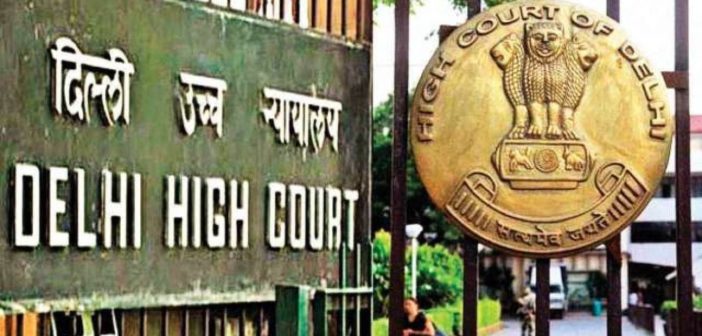In this edition of Court judgements review, we look at the Supreme Court’s judgement on Food Safety and Standards Act, Delhi High Court’s decision on divorce, Odisha High Court’s judgement on ‘Viscera report’ in murder cases, Jharkhand High Court’s judgement on reservations in cases of migration, and Jammu and Kashmir and Ladakh High Court’s decision on detention.
Supreme Court: Food Safety and Standards Act will take precedence over the Prevention of Food Adulteration Act where inconsistencies exist.
The apex court, in Manik Hiru Jhangiani vs. The State of Madhya Pradesh, held that when a violation falls under both the Prevention of Food Adulteration Act, 1954 (PFA), and the Food Safety and Standards Act, 2006 (FSSA), the FSSA prevails over the PFA where inconsistencies exist.
The two-judge bench comprising Justice Abhay S. Oka and Justice Sanjay Karol was hearing an appeal against the judgement of the High Court that refused to quash the proceedings for an alleged violation under the FSSA 2006. In this case, the appellant was a Director at M/s. Bharti Retail Limited, operating ‘Easy Day’ stores nationwide. A Food Inspector, registered under the PFA, visited a Bharti-owned shop in Indore on 29 November 2010, purchasing specific biscuit packets. Samples were sent to the State Food Laboratory the next day, and the report arrived on 4 January 2011. Despite the PFA’s repeal on 5 August 2011, as notified in Section 97(1) of the FSSA, Section 97(4) of the FSSA allowed prosecuting offenses committed under the PFA within three years from the commencement of the FSSA. An FIR was filed under the PFA on 12 August 2011 on ‘misbranding’ allegations. When challenged before the High Court, the petition was dismissed. The appeal is against this judgement.
The Counsel for the State argued that the offence was committed prior to the repeal of PFA, and the PFA Rules 1955 were still in force at the time of the commission of offence, the prosecution for violating the provisions of the PFA Act and the PFA Rules will certainly be maintainable. However, the Counsel for the petitioner argued that for violation of the provisions regarding misbranding, under PFA, the violator could be punished by imposing imprisonment of up to three years. However, under the FSSA, there is a provision for a levy of only a penalty up to Rs. 3 lakhs. Further, when two statutes are operating in the field prescribing a penalty for the same offence and when an earlier statute contains a more stringent penalty or punishment, the provision in the earlier statute will stand repealed by necessary implication.
The court looked at the provisions of ‘misbranding’ under both statutes. It also looked at the Sub-section (4) of Section 97 of the FSSA act, also known as the sunset clause.

The implication of sub-section (4) of Section 97 is that if an offence is committed under the PFA when the PFA was in force, cognizance of the crime can be taken only within three years from the date of commencement of the FSSA. Further, Section 89 of the same act provides for overriding effect over other laws.

The punishment under PFA and the penalty under the FSSA cannot be imposed on the violator for the same misbranding because it will amount to double jeopardy, which is prohibited under Article 20(2) of the Constitution of India. The only question is which of these two shall prevail, and it is answered by Section 89 of the FSSA 2006. This is a case where the alleged act of misbranding was committed when the relevant provisions of the FSSA, and in particular, Section 52 thereof, were already brought into force. Therefore, we are dealing with a situation where the act of misbranding will attract penal provisions both under the PFA and the FSSA. Thus, Section 89 of the FSSA comes into the picture.
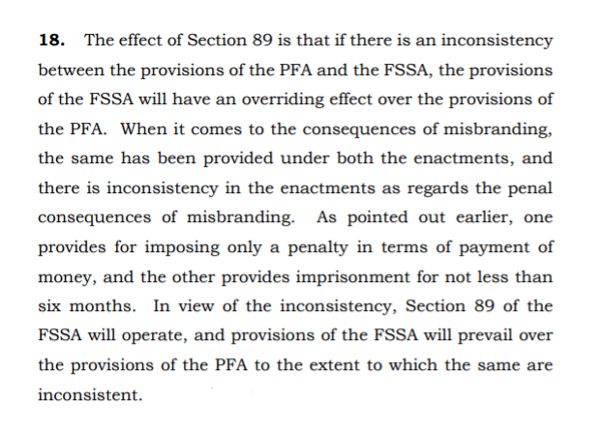
Accordingly, the High Court judgement is set aside, and the proceedings are quashed.
Delhi HC: Reckless, defamatory, humiliating, and unsubstantiated allegations by one spouse, which has the impact of publicly tarnishing the image of the other spouse, is nothing but acts of extreme cruelty.
The Delhi High Court, in X vs. Y, held that public acts of humiliation, casting doubts on the reputation, character and fidelity of her husband certainly amounted to causing indelible mental agony and amounts to cruelty.
The division bench of Delhi High Court comprising Justice Suresh Kumar Kait and Justice Neena Bansal Krishna was hearing an appeal against the order of the Family Court that granted divorce to the husband on grounds of cruelty. In this case, both parties got married on 28 February 2000, and one son, Rudraksha, was born from their wedlock on 27 April 2004. The husband found out that the spouse falsely projected her educational qualifications before marriage. He further alleged that her father would interfere with his professional work, which he had declined to do so. In addition, the husband alleged that his wife was of a suspecting nature, frequently picking up fights, suspecting that the respondent was having interest in other women and thereby, causing embarrassment for him in restaurants and public spaces. It is also alleged that his wife used to use filthy language and regularly threatened him that she would commit suicide and implicate him and other relatives in criminal matters. He was even coerced to undergo an impotency test on the pretext of treatment for depression when he refused to indulge in sexual activity after the birth of the first child. On account of all these factors, the husband sought divorce on the grounds of cruelty which has been granted.
These allegations were refuted by the wife. The court looked at the facts of the case, wherein it could not find sufficient evidence refuting these allegations. The court relied on the apex court judgement in Vijay Kumar Ramachandra Bhate vs. Neela Vijay Kumar Bhate, whereby it was held that levelling disgusting accusations of unchastity and indecent familiarity with a person outside wedlock and allegations of extramarital relationship is a grave assault on the character, honour, reputation, status as well as the health, and it would amount to worst form of insult and cruelty, sufficient by itself to substantiate cruelty in law.
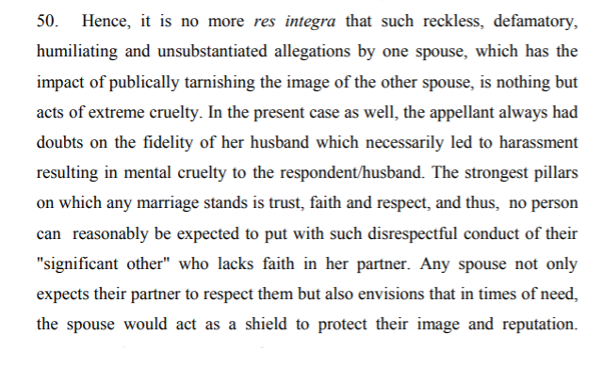
Accordingly, the appeal is dismissed.
Odisha HC: Omission on the part of the investigating agency in sending the viscera for examination is nothing less than misconduct.
The Odisha High Court, in Prasanta Kumar Moharana vs. State of Odisha, held that failure on the part of the investigating officer to procure the viscera report from the State Forensic Science Laboratory is a serious lapse in the investigation. Further, omission on the part of the investigating agency in sending the viscera for examination is nothing less than misconduct.
The Division Bench of Odisha High Court comprising Justice Sangam Kumar Sahoo and Justice Chittaranjan Dash was hearing an appeal against the trial Court’s ruling that found the appellant guilty under Section 302 of the IPC for causing the deceased’s death by poisoning him through milk.
The Court aimed to ascertain whether the deceased’s death was indeed caused by homicide. To do so, the Court examined the testimony of the doctor who conducted the deceased’s post-mortem examination. The doctor couldn’t definitively determine the cause of death and thus retained a sample of viscera for chemical analysis. While suggesting that death ‘likely’ resulted from ingesting endosulfan insecticidal poison, the doctor’s opinion lacked certainty. The Court observed that although the viscera sample was purportedly sent for chemical examination to the State Forensic Science Laboratory (SFSL), this report hadn’t been presented as evidence in the trial Court. Furthermore, the Court highlighted the absence of evidence proving that the investigating officer had obtained the viscera report from the SFSL. Additionally, the doctor hadn’t expressed a specific opinion regarding the exact cause of the deceased’s death.
The court highlighted the importance of viscera report in cases of poisoning. It relied on Chhotan Sao vs. State of Bihar which stressed the importance of preserving viscera reports. It noted that the public prosecutors and judicial officers bear a heightened responsibility to ensure adherence to the law in criminal cases. Any negligence, as witnessed in the present case, is likely to compromise the prosecution’s case, leading to unnecessary acquittals.
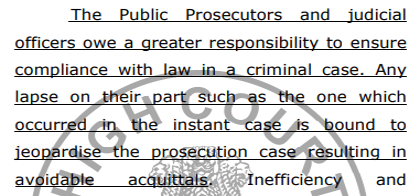
Further, in the recent judgement of Hariprasad @Kishan Sahu vs. State of Chattisgarh, the apex court reiterated circumstances to be proved in cases of murder by poison.
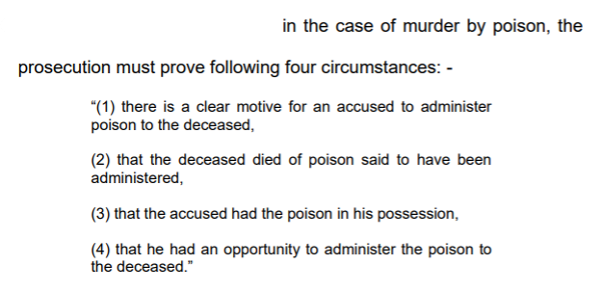
The court further held that not only the source of procurement of poisoning was required to be established by the prosecution beyond all reasonable doubt, but it was the requirement to prove the viscera report. Thus, in the absence of a viscera report and strong evidence, the benefit of doubt weighed in favour of the appellant and hence is acquitted of the charge of murder.
Jharkhand HC: It is a settled position of law that a person, who has migrated to the other State, shall get benefit of reservation only in the State of origin.
In Rina Kumari Rana @ Reena Kumari Rana vs. The State of Jharkhand & Ors, the Jharkhand High Court held that a person, who has migrated to the other State, shall get the benefit of reservation only in his/her parent State i.e., the State of origin and not in the migrant State, even though the caste of that person is being given the benefit of reservation in the migrant State.
The single Judge bench of Justice Rajesh Shankar was hearing a writ petition that has been filed for declaring the petitioner to have passed in the Combined Graduate Trained Teacher Competitive Examination, 2016 for appointment to the post of Teacher (Hindi). After the success in the examination, her candidacy was rejected during the certificate verification process on the grounds that she had submitted the caste certificate of Scheduled Tribe on the basis of her husband.
The counsel for the petitioner argued that the petitioner hailed from the State of Bihar and identifies with the ‘Lohara’ caste. Having married an individual from the State of Jharkhand belonging to the same caste, the petitioner sought a Scheduled Tribe (S.T) certificate from the competent authority in Jharkhand. Subsequently, the Sub-Divisional Officer in Godda issued residential and caste certificates to her on 5 May 2016, based on the details provided about her husband. Yet, her candidature was rejected because she had submitted a caste certificate of S.T. category on the basis of genealogical table of her husband.
Upon looking at the facts of the case, the High Court relied on multiple judgements of the Constitutional bench of the apex court. In Marri Chandra Shekhar Rao vs. Dean, Seth G.S. Medical College & Others, it was held that balancing must be done between those who need protection and those who need no protection, i.e., who belong to advantaged castes or tribes and who do not, and if in all States the special privileges or the rights granted to Scheduled Castes or Scheduled Tribes are carried forward, it will also be inconsistent with the whole purpose of the scheme of reservation.
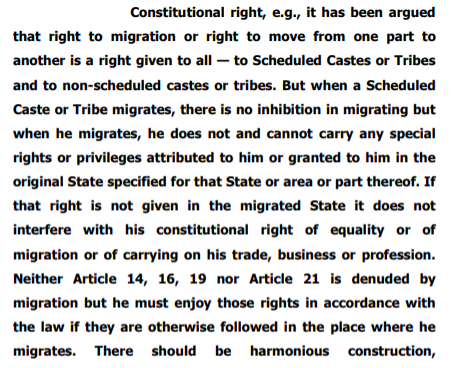
Further, in Action Committee on Issue of Caste Certificate to SCs/STs in the State of Maharashtra & Another vs. Union of India & Another, the apex court held that,

Thus, in accordance with the above judgements and some earlier judgements of the Jharkhand High Court on similar matters, it is held that a person, who has migrated to the other State, shall get the benefit of reservation only in the State of origin. Accordingly, the petition is dismissed.
Jammu and Kashmir and Ladakh HC: Unsatisfactory and unexplained delay in executing the order of detention, would throw considerable doubt on the genuineness of the subjective satisfaction of the detaining authority.
The Jammu and Kashmir and Ladakh High Court, in Owais Syed Khan vs. Union Territory of Jammu and Kashmir and Ors, held that unsatisfactory and unexplained delay in executing the order of detention leads to a legitimate inference that the detaining authority was not really and genuinely satisfied as regards the necessity for detaining the detinue.
The Single judge bench of the High Court comprising Justice Sanjay Dhar was hearing a Habeas Corpus petition, challenging the detention order issued by the District Magistrate, Srinagar, where the petitioner was placed in preventive custody for preventing him from acting in any manner prejudicial to security, sovereignty, and integrity of the State.
The petitioner argued about the delayed execution of the detention order, and also some lapses and non-compliances in procedural safeguards, and non-provisioning of grounds for detention among others, while challenging the detention order. The counsel for the state argued that the grounds urged by the petitioner were legally misconceived, factually untenable and without any merit.
Looking at the facts of the case, the High Court held that unreasonable delay cast doubt on the genuineness of the detention.
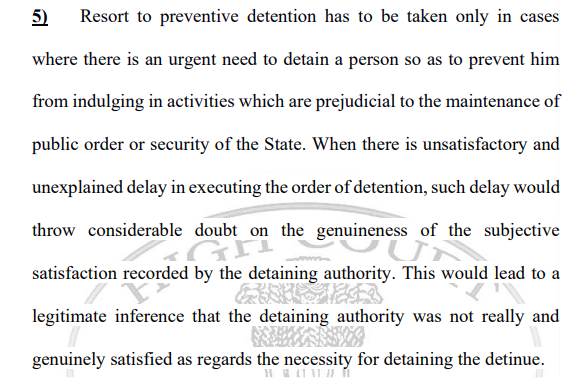
Further, reliance was placed on several apex court judgements, such as Manju Ramesh Nahar vs. Union of India and others, and S M F Sultan Abdul Kader vs. Jt. Secy., To Govt. Of India & Ors, wherein the apex court held unexplained delay in execution of the order of detention to be fatal.

In this case, the court observed that there has been no explanation on the part of the respondents regarding the delay in execution of the detention order. The same, therefore, renders the detention order unsustainable in law. Accordingly, the petition is allowed, and the detention order is quashed.


